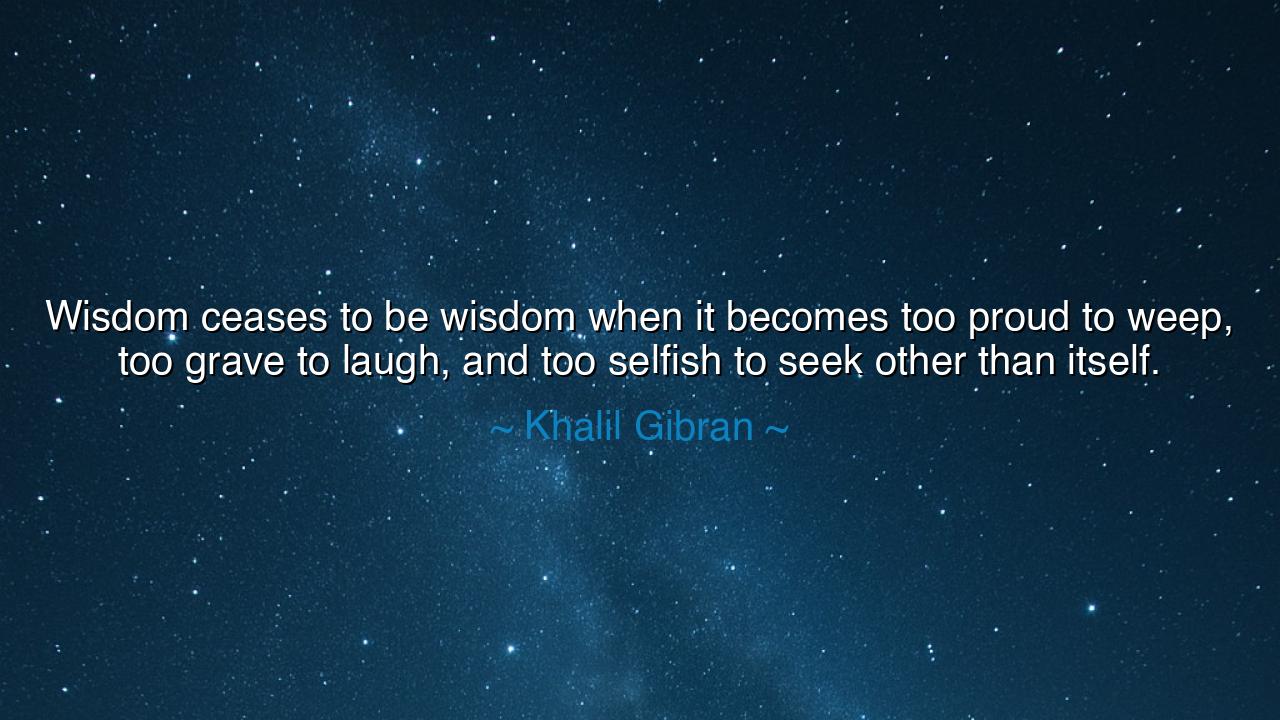
Wisdom ceases to be wisdom when it becomes too proud to weep
Wisdom ceases to be wisdom when it becomes too proud to weep, too grave to laugh, and too selfish to seek other than itself.






Wisdom, at its highest form, is a living, breathing force—a harmony of mind, heart, and spirit. When Khalil Gibran, the poet of the soul, declared, “Wisdom ceases to be wisdom when it becomes too proud to weep, too grave to laugh, and too selfish to seek other than itself,” he warned that even the loftiest knowledge can decay into arrogance. True wisdom is not cold or detached; it is vibrant and compassionate. When it grows proud, when it loses its ability to feel deeply, to laugh joyfully, or to serve humbly, it ceases to be a guiding light and becomes a dark, hollow shell of itself.
At the heart of Gibran’s teaching lies the balance between intellect and humanity. Weeping is a sign of empathy, the soul’s response to suffering and injustice. When wisdom is too proud to weep, it becomes disconnected from the struggles of others, like a king who no longer listens to his people’s cries. Likewise, laughter is the expression of joy and humility. A wise person who cannot laugh becomes rigid, imprisoned by self-importance. Finally, when wisdom seeks only to glorify itself rather than serve others, it turns inward and rots, like stagnant water cut off from the flowing stream of life.
History offers a powerful example in the fall of the ancient Roman Senate. In its early days, Rome’s leaders sought the good of the Republic, balancing power with duty. But over time, many senators grew proud, deaf to the cries of the poor and blind to the need for reform. Their decisions were guided not by service but by self-interest. They became “too proud to weep,” unmoved by suffering, and “too grave to laugh,” unable to connect with the vitality of the people. Their wisdom curdled into tyranny, paving the way for Caesar’s rise and the end of the Republic.
Conversely, consider Abraham Lincoln, whose leadership during the American Civil War reflected the very qualities Gibran describes. Lincoln was a man of profound wisdom, yet he wept openly for the suffering of both North and South. He laughed often, using humor to heal divisions and remind others of shared humanity. Most importantly, he did not seek wisdom for his own glory, but for the survival of a nation. His humility and compassion gave strength to his decisions, showing that wisdom thrives when it remains connected to the human heart.
Gibran’s words are also a personal challenge. Many who gain knowledge fall into the trap of superiority, believing themselves above the emotions and joys of ordinary life. But wisdom without emotion becomes sterile, and wisdom without service becomes dangerous. To truly be wise, one must be willing to weep with the suffering, to laugh with the joyous, and to seek truth for the sake of others, not for personal gain.
Let this teaching be passed to future generations: wisdom is not a crown to be worn, but a torch to be carried. As Khalil Gibran teaches, the moment it grows too proud, too rigid, or too self-absorbed, it ceases to be wisdom at all. The path of true wisdom lies in humility, compassion, and the courage to feel deeply, for only then can it light the way for others and heal a world in darkness.






TTthoan tran
This quote resonates deeply because it suggests that true wisdom is grounded in balance and compassion. But I also wonder, is there a danger in seeking too much emotional expression when it comes to wisdom? Can wisdom sometimes require detachment in order to make objective decisions? It’s a fine line, isn’t it—knowing when to stay grounded and when to embrace emotion? How do we navigate that?
TVTrang Vu
I love how Gibran connects wisdom with emotions, particularly laughter and tears. It's a reminder that being wise doesn’t mean being emotionless or distant. But, does this mean that we’re only truly wise when we embrace vulnerability and imperfection? How do we prevent ourselves from becoming so absorbed in emotions that we lose our clarity of thought? Maybe wisdom is more about knowing when to embrace these emotions and when to step back.
NQbui tui nhu quynh
This quote makes me think that wisdom isn’t just about knowledge, but about humility and empathy. Can someone truly be wise if they are detached from others' feelings or experiences? I think the idea that wisdom needs to be selfless and open to vulnerability is spot on, but I wonder if there's a line where being too emotional can make us lose sight of what wisdom truly is. How do we balance wisdom with compassion?
HHHien Ho
Gibran's perspective on wisdom really challenges the conventional notion of being wise as being serious or stoic. I agree that wisdom should be flexible and open to emotion, but can wisdom sometimes require restraint or seriousness? Is there a point when too much emotion, like laughter or tears, could cloud sound judgment? I'm curious if wisdom can exist without this emotional balance, or if it’s something we must always nurture.